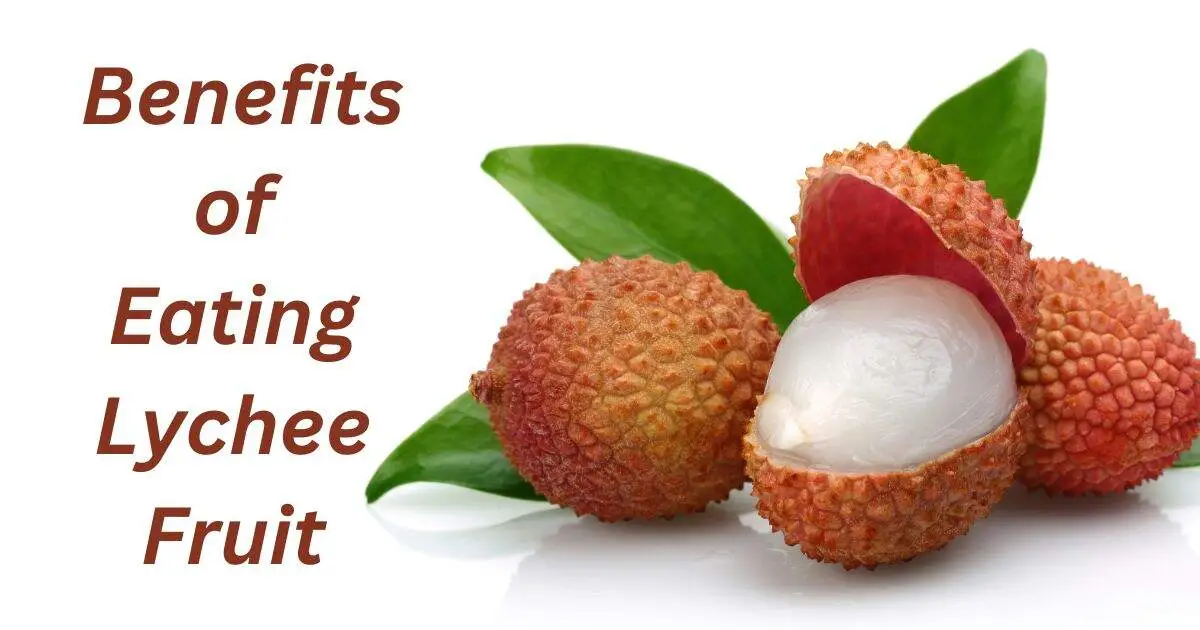Introduction
The lychee (Litchi) fruit is a good source of food and nutrition and has good medicinal value. There are several benefits of eating lychee fruit that you can understand in detail in this article.
Lychee (Litchi chinesis Sonn) is a tropical and subtropical fruit mainly produced in China, India, Vietnam, and the rest of Southeast Asia. It has become one of the most popular fruits because of its attractive red color, delicious flavor, and high nutritional value.
The Lychee fruit is characterized by a thin and pink-red color pericarp (outer thin covering), the edible part aril which is dull white, and juicy and covers the single brown-black seed.
It is usually consumed as fresh fruit or in processed forms like jellies, jams, juices, ice cream, and sauces.
Lychee fruit, for centuries, has been used in traditional Chinese medicine to treat various diseases such as stomach ulcers, dyspepsia, cough, and diabetes and to kill intestinal worms.
Read More: Carrot Beetroot Juice Benefits
Nutritional Profile of Lychee
The nutritional content of lychee fruit per 100 grams, as per USDA is shown below.
Is Eating Lychee Good For You?
Fruits are a crucial part of a balanced diet that provides essential nutrients and antioxidants to optimize your overall health. Lychee is a low-calorie fruit and is a good source of fiber, protein, vitamins, and minerals. This tropical fruit helps to boost the immune system and promotes healthy skin.
The high fiber content of lychee fruit improves digestion and keeps your bowel movement regular. Lychee helps regulate blood pressure and is an excellent choice for weight management. According to studies, Lychee can be consumed as a dietary supplement as well as in pharmaceuticals.
Benefits of Eating Lychee Fruit
Let’s have a look at how lychee is beneficial for your health…
1. Boosts Immunity: Lychee contains an excellent amount of Vitamin C, with other nutrients like Vitamin B6, selenium, and zinc. These nutrients help to support your immune function and boost your immunity.
2. Good for Digestive Health: Lychee is a good source of fiber. Fiber is essential to improve your gut health and keep your bowel movements regular, preventing constipation.
3. Heart Health: Lychee fruit contains nutrients like potassium, copper, fiber, and antioxidants. Potassium and copper help in maintaining body fluid balance and regulating blood pressure. Antioxidants and fiber help to promote cardiovascular health.
4. Benefits of Eating Lychee Fruit for Weight Loss: Lychee contains a good amount of fiber. Studies suggest fiber-rich food reduces appetite and keeps you satiated, increases metabolism, and improves digestive health which as a result helps to reduce weight.
5. Low Glycemic Index Food: Lychee is a low glycemic index food, which means that lychee is digested and absorbed slowly into the body and avoids a rapid rise in blood sugar levels.
6. Benefits of Eating Lychee for Skin: Lychee is rich in vitamin C, an antioxidant. It prevents inflammation, protects the skin from sun damage, reduces dark spots or hyperpigmentation, and improves the elasticity of your skin, making you feel younger.
7. Benefits of Eating Lychee Fruit for Pregnancy: Lychee contains a vitamin called folate. Your body requires folate to make DNA and other genetic material. Folate, when consumed regularly during pregnancy, prevents brain and spine birth defects in babies.
There is not enough research to decide whether lychee has any adverse effects when consumed during lactation or pregnancy. Breastfeeding and pregnant women should consult their doctor before eating lychee.
8. Acts as Antioxidants: It is a good source of antioxidants such as polyphenols and flavonoids. It protects our body from free radical damage, oxidative stress, and inflammation. It also effectively prevents degenerative disease and inhibits the growth of certain cancer cells.
How To Incorporate Lychee Into Your Diet
Consume fresh ripe lychee fruit and enjoy it as a delightful addition to your diet.
You can add Lychee to smoothies and desserts, or prepare fresh juice from the ripe lychee fruit.
Wines and dried fruits are prepared from lychee fruit.
Lychee Side Effects
Lychee fruit is usually not considered an allergic food. But sometimes, lychee may cause allergic reactions in some individuals.
Lychee contains some compounds that may cause allergic.
If you find any symptoms after eating lychee, such as
- Urticaria
- Itching
- Swollen tongue
- Swollen throat
- Difficulty in breathing
- Loose motion
Consult your doctor and get the required treatment.
Precaution
As you now know, there are multiple health benefits of eating lychee fruit. However, it is advised to be cautious when you are on insulin or medicines for diabetes, as lychee has the potential to lower blood sugar levels. Thus, lychee should be taken in moderation, or you can consult your health expert before adding lychee to your diet.
Lychee may interact with the drugs and increase the risk of bleeding when taken with them such as aspirin, warfarin, heparin, clopidogrel, ibuprofen, or naproxen. It also interacts with antivirals, cardiovascular agents, cholesterol-lowering agents, or pain relievers.
If you are taking any of the above medications, consult your doctor first.
Conclusion
Lychee is a delicious, sweet, and versatile summer fruit. It is packed with vitamins, minerals, and antioxidants. You can see multiple health benefits of eating lychee fruit in this article. Consuming lychee in adequate amounts may protect you from heart disease, regulate blood pressure, prevent cancer, improve digestive health, and support weight loss. Lychee is high in antioxidants, especially vitamin C. These antioxidants protect and nourish the skin and reduce hyperpigmentation, making your skin tone even and bright.
Sometimes, lychee may cause an allergy, so be cautious if you are suffering from any health condition. Overall, Lychee is a delicious and healthy fruit. Consuming lychee in moderation can provide you with maximum health benefits. Overeating is not recommended.
FAQ’s
Q1. What are the health benefits of eating lychee fruit?
Ans. Lychee is a nutritious fruit that shows various benefits, such as
- Supports weight loss goals
- Improves digestion and prevents constipation
- Protects the skin from harmful UV rays
- Regulates heartbeat and blood pressure
- Lowers blood sugar levels
- Maintain the electrolyte balance of the body
- Acts as an anti-inflammatory
- Boost the immune system
- It may prevent the common cold, osteoarthritis, asthma, and macular degeneration.
Q2. Does Lychee burn fat?
Lychee is low in calories and high in water content, fiber, and antioxidants. Studies suggest these nutrients aid in burning fat.
Q3. Is lychee rich in sugar?
Ans. Lychee contains 15.23 grams of sugar per 100 grams. But it is low in calories and has a low glycemic index, which means it releases sugar slowly into the bloodstream, preventing sudden spikes in blood sugar levels. So, eating Lychee in moderation (4 to 5 lychees) will not raise your blood sugar levels, and you can enjoy having your delicious, juicy fruit.
Q4. Is lychee good for health?
Ans. Lychee is packed with antioxidants, fiber, protein, vitamin C, folate, carbohydrates, and minerals such as potassium, phosphorus, magnesium, copper, zinc, and selenium. These nutrients are crucial for your body and are required to maintain your overall health. Do not eat unripe lychees as they may contain hypoglycin A, which can lead to adverse reactions in some people.
Q5. How many lychees can I eat a day?
Ans. Lychees are nutritious fruits, but they should be taken in moderation. Adults can consume 8 to 10 lychees (100 grams) a day. If you are suffering from diabetes or on weight loss goals, 5 to 6 lychees are good enough to eat.
References
Biological and Phytopharmacological Descriptions of Litchi Chinensis
https://www.ncbi.nlm.nih.gov/pmc/articles/PMC4791990/
Lychee nutrition
https://fdc.nal.usda.gov/fdc-app.html#/food-details/1102668/nutrients
Nutrient components, health benefits, and safety of litchi
https://pubmed.ncbi.nlm.nih.gov/33337091/
Metabolite Differences of Polyphenols in Different Litchi Cultivars (Litchi chinensis Sonn.) Based on Extensive Targeted Metabonomics
Role of polyphenols in combating Type 2 Diabetes and insulin resistance
https://www.sciencedirect.com/science/article/abs/pii/S0141813022004548
Food Polyphenols and Type II Diabetes Mellitus: Pharmacology and Mechanisms
https://www.mdpi.com/1420-3049/28/10/3996
Lychee (Litchi chinensis): Biochemistry, Panacea, and Nutritional Value





1 thought on “9 Surprising Health Benefits of Eating Lychee Fruit”